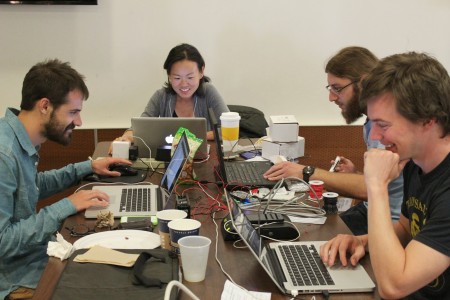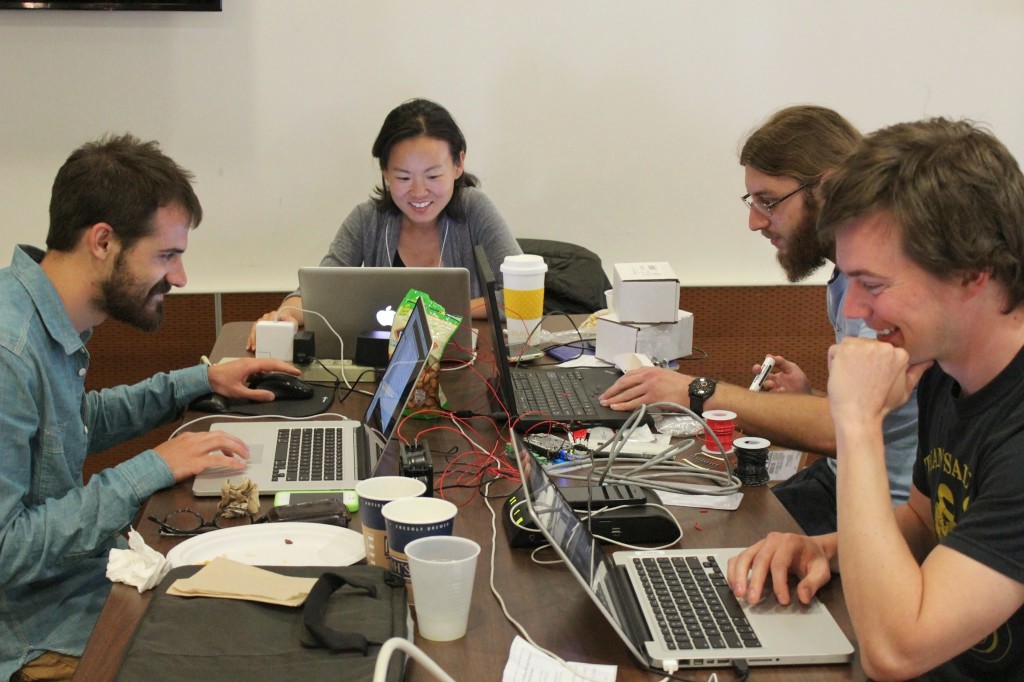By day scientists at Lawrence Berkeley National Laboratory (Berkeley Lab) are researching ways to better tackle our country’s energy and environmental challenges. By night some of them are doing, well, the exact same thing. Using the knowledge from their day jobs some enterprising researchers are harnessing the power of big data to create innovative solutions for conserving water and energy.
This emerging “cleanweb” sector leverages information technology tools and analytics to enable more efficient use of resources. One team of Berkeley Lab researchers developed a smart sprinkler system that captures rainfall data from the past week to decide whether to water the lawn. Another team developed a system that tells you when your power company is providing the cleanest energy.
Both of these ideas were developed at the Berkeley Cleanweb Hackathon, sponsored by the Berkeley Energy & Resources Collaborative (BERC) based at UC Berkeley and run by John Romankiewicz, a Berkeley Lab senior research associate and self-styled “eco-rapper” who, as “Sustainable John,” raps in both English and Chinese. He started the first hackathon in 2013 as a way to bring business and engineering students together with Berkeley Lab researchers and thus broaden participation in the potentially impactful cleanweb sector.
“Students are seeing this next cleantech trend,” Romankiewicz said. “First, everyone got excited about technologies and hardware, like solar panels, wind turbines, smart grid. There’s a thesis that those produced a lot of cost reductions and great technologies, but it also burned a lot of investors because there were lots of losers and only some winners. The next wave of investment is ‘capital light.’ It’s not ‘let’s go build a factory.’ It’s ‘let’s make software that uses all these great solar, building, and wind technologies in the best way possible.’ All of this will require less capital investment up front, which is good for expanding more quickly and spurring new ideas.”
The Hackathons both last year and this year attracted dozens of grad students and Berkeley Lab researchers. They were both hosted by the Center for Information Technology Research in the Interest of Society (CITRIS) on UC Berkeley’s campus. Andrew Weber got the idea for his Smarter Sprinkler system while sitting at home one day. “My apartment has this bad automated sprinkler system that goes on at the same time every day—at 6 p.m. it turns on for five minutes, rain or shine,” he said. “It just struck me as a ridiculous thing.”
Weber decided to enter this year’s Hackathon, which was held over the course of a weekend in April, with fellow Berkeley Lab researchers Anna Liao and Daniel Olsen, and local developer Robert Sadler. They came up with a system based on open-source hardware and software that grabs weather conditions over the past seven days from the Internet and ensures your lawn will get 1 inch of water per week, the amount needed for a healthy lawn.
The algorithm also takes into account drought conditions, to scale down watering as users desire, as well as seasonal variations, to water more in the summer and less in winter, for example. “There are smart sprinkler systems on the market that will connect to the Internet and see if it has rained that day. But that’s where the intelligence ended,” Weber said. “It seemed to me there are more opportunities to save. In California more than 50 percent of total residential water use is outdoors.”
Since taking the grand prize at this year’s Hackathon Weber, who works on energy efficient buildings at Berkeley Lab, and Olsen, who works on industrial energy use, are continuing to develop their sprinkler system, adding forecasting capabilities and installing prototypes at a few test sites. The system also collects data from all users, which would allow it calculate, for example, the aggregate water savings for a city. “Users will be able to set their own thresholds, depending on how much they value their water and their lawn,” Olsen said.
A winner at last year’s Berkeley Cleanweb Hackathon has also continued to commercialize their product. WattTime collects openly available real-time data from grid operators to determine when power companies are generating dirty energy, such as by burning coal, and when the electricity is clean, or coming from renewable sources.
“Each grid operator makes a slightly different subset of data available in slightly different formats,” said Anna Schneider, who has a doctorate in biophysics and works on energy efficiency at Berkeley Lab. “The work we’ve been doing over the past year is collecting and standardizing all that data, and making it easy to share and use. We’re the first ones we know of to make it really easy to connect up-to-the-minute data about what’s happening on the grid to what’s happening inside your smart devices.”
By signing up for an alert, users can find out, for example, what is the cleanest time to do their laundry. Coal-generated power emits about 2,000 pounds of carbon dioxide per megawatt-hour of energy produced while natural gas emits 1,000 pounds and renewables emit zero. Because demand and supply must be balanced on the grid on a second-to-second basis, the mix of energy sources is constantly changing, often depending on the availability of renewable sources, such as solar and wind.
Schneider, a computational scientist, met WattTime co-founder Gavin McCormick at the Hackathon. Together their venture has won numerous prizes including, most recently, a 2014 Echoing Green Climate Fellowship.
“Our goal is to have people and businesses leverage WattTime to automatically use their energy at the smartest time, whether it’s charging their vehicles or using commercial equipment,” Schneider said. “All this stuff is increasingly connected.”
# # #
Lawrence Berkeley National Laboratory addresses the world’s most urgent scientific challenges by advancing sustainable energy, protecting human health, creating new materials, and revealing the origin and fate of the universe. Founded in 1931, Berkeley Lab’s scientific expertise has been recognized with 13 Nobel prizes. The University of California manages Berkeley Lab for the U.S. Department of Energy’s Office of Science. For more, visit www.lbl.gov.


